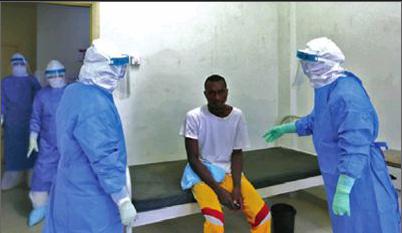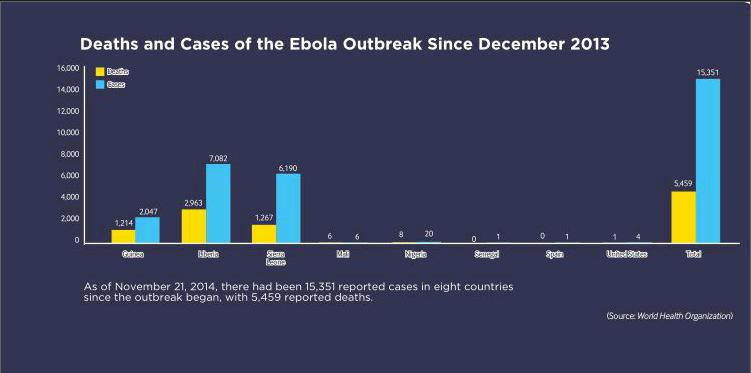Controlling An outbreak
2014-12-19ByheWenping
By+he+Wenping


The Ebola epidemic in West Africa has killed 5,459 people since its outbreak in Guinea in December 2013. The virusrapid spread into neighboring countries led the World Health Organization (WHO) to classify it as an international public health emergency on August 8. The three worst-hit countries are Guinea, Liberia and Sierra Leone.
Secondary infection cases were reported in the United States and Spain in October after three local medical workers contracted the disease after treating patients from Africa in their hospitals. The infected people in the United States and Spain have since been cured.
In addition, a case was discovered in India on November 18, becoming the first appearance of Ebola in Asia. The infected person is a 26-year-old Indian who had spent time in Liberia.
Encouragingly, less-affected Senegal and Nigeria were declared free of Ebola by the WHO on October 17 and 20, respectively. New cases have also declined in Liberia in recent months and the epidemic in Guinea is now under control. However, new cases are still on the rise in Sierra Leone.
The WHO warned that although the rate of new cases is slowing in parts of West Africa, the battle against the epidemic has not yet come to an end.
A regional emergency
The Ebola virus can cause a severe and often fatal hemorrhagic fever in humans. It has a very high case-fatality rate. There have been at least three large-scale outbreaks and over 10 small plagues of the Ebola virus in the last 30 years since the first outbreak in Africa in 1976. Before the ongoing epidemic, the Ebola disease did not disperse outside Africa and was confined to a few countries.
The current outbreak is much more serious than before in terms of deaths and infection rates due to the underdeveloped economy and public health system in West African countries. Local people lack necessary knowledge and conditions to contain an epidemic early. Meanwhile, loose border controls allow the Ebola virus to disperse easily from one country to the next.
Poverty is another major reason for rampant infectious diseases such as Ebola in Africa. Nearly half of African people live in extreme poverty, earning an income per capita of less than $1.25 a day. The undeveloped economy is a factor in the poor state of healthcare services as well as weak prevention and treatments for epidemics.
Many urban and rural areas in West African countries are lacking in medical equipment and healthcare staff. Even clean drinking water resources are much needed. With poor education on average, the public is unaware of basic medical knowledge and prevention measures. Especially in some regional countries, local people customarily touch the dead body of a relative in a traditional funeral, which increases the possibility of infection. Therefore, when a virus becomes epidemic in these areas, it is difficult to contain.endprint

At the beginning of the Ebola epidemic, the international community did not provide prompt help for West Africa. Five months after the outbreak, the WHO realized its seriousness and announced a public health emergency. The Ebola outbreak had not caught the attention of the international community because it had not spread outside Africa before. Many developed countries are thus slow to research and develop vaccines and medicines for curing Ebola.
UN Secretary General Ban Ki-moon held a special high-level meeting during the 69th UN General Assembly in New york City on September 25, in which he called on more countries to participate in the battle against the Ebola outbreak.
Under coordination of the WHO and the UN, China—together with the United States, France, the United Kingdom, Germany and Cuba—provided funds and medical assistance, including virus detection laboratories and medicines, as well as doctors, to affected areas in West Africa. Support and aid from the international community have helped West African countries contain the outbreak.
In addition, authorities and medical workers in affected countries have continually improved their anti-Ebola programs. For example, the WHO feared that Ebola would spread in Nigeria—the most populous country in Africa, with 160 million people—when the first case was found in its capital city of Lagos on July 23. However, Nigeria successfully contained the epidemic by using virus detection methods and strictly quarantining every person who made contact with an Ebola patient. Nigerias experience is now being introduced to other countries struggling with the outbreak.
Chinese aid
In the battle against the Ebola outbreak, China has always attached importance to providing help for West African countries. In April, at the early stage of the outbreak, China donated medical equipment and materials worth 1 million yuan($162,900) to Guinea, Liberia, Sierra Leone and Guinea-Bissau, respectively.
As the outbreak spread, the Chinese Government on August 7 provided epidemic areas with a second round of emergency humanitarian aid, including protective clothing, sanitizers and thermo-detectors, totaling 30 million yuan($4.89 million).
Chinese President Xi Jinping announced 200 million yuan ($32.6 million) in aid including funding, food and materials to epidemic countries on September 18, in addition to a cash donation of $2 million to the WHO and the African Union each.endprint
China launched the fourth round of aid to Ebola-affected countries on October 29. More Chinese public health experts were sent to critical areas to help train local doctors and nurses. Medical equipment including sick beds, ambulance vehicles and personal protective kits were also delivered to these countries. The Chinese Government also donated $6 million to a UN trust fund countering the Ebola outbreak. The Chinese Government has launched a long-term program to support public healthcare development in Africa. Under the program, China will organize epidemic prevention trainings for the three countries worst hit by the Ebola virus, the AU and the Economic Community of West African States in 2015. Chinese scientists will participate in building the centers for disease control and prevention in Africa along with the AU. In addition, China will enhance cooperation with the international community to cope with the Ebola virus. Chinese representatives have attended regular UN meetings on Ebola response. Aid from China to epidemic areas and international organizations has reached 750 million yuan ($122 million) so far. Most importantly, Chinese medical corps have played an important role in helping contain the outbreak.
At present, there are 43 Chinese medical teams in 42 African countries, with nearly 1,000 team members. As the Ebola outbreak unfolded, Chinese medical teams did not leave the affected countries. On the contrary, they have actively participated in the battle against the epidemic alongside local people.
On November 15, two anti-Ebola teams of more than 200 Chinese medical workers and health experts arrived in Liberia and Sierra Leone.
During the dedication ceremony of a 100-bed China-aid Ebola treatment center in Monrovia, Liberia, on November 25, Cui Li, vice Minister of Chinas National Health and Family Planning Commission, said that three batches of 500 medical staff from China will work in the center for six months to observe suspected Ebola patients and treat confirmed cases. Additionally, the teams will provide training to healthcare workers in Liberia.
According to official figures, China has sent more than 500 medical staff members and public health experts to Ebola-hit countries in West Africa since the outbreak, making it the country with the most foreign medical persons working in Ebola-affected countries.endprint
